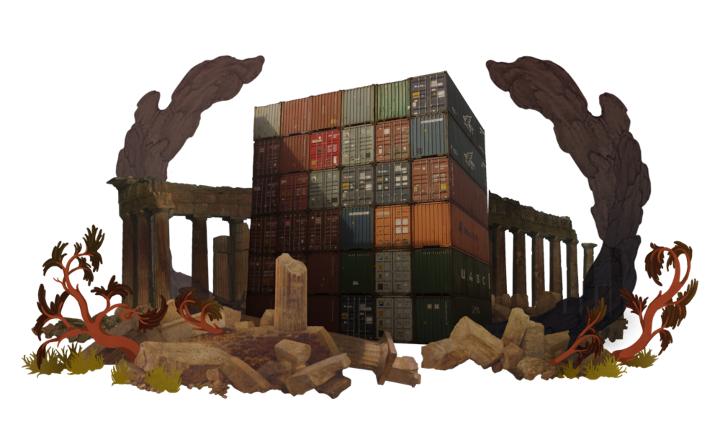You're sitting in class, say a 300 level psychology course you've been looking forward to. But when the teacher begins the lesson, you get the feeling no one else read the material. You begin to experience that familiar irritation, the urge to dominate, and a little paranoia. Later, just as you've maneuvered the group into an interesting discussion, it happens: someone says something pointedly obtuse. For the next 45 minutes, for which you are paying high sums of money, the class is dominated by willful stupidity, pointless ill-formed questions with self-evident answers, and an unconscious message which seems to reduce to: "I will not be excluded because of ignorance or laziness."
You are quietly boiling with frustration, and you ask yourself: Is this worth it?
The professor looks just as bored and irritated as everyone else, and yet he does nothing to prevent it - perhaps because he too would rather allow the class to be sabotaged than potentially learn something. You finally summon the tact to steer the discussion back towards a productive thread, and in the last few minutes you manage to squeeze something like an education out of this farce.
No one thanks you. And in your next class, headed by an activist unqualified to teach dodgeball, you lose your patience and contradict the dogma passed around like communion. You are attacked from many angles at once, because none of the many others who feel the same will speak up. You have been marked for exclusion, and none of them feel that the question of truth and falsehood is worth the social risk.
It's important to understand that although leftist politics dominates the university today, the reasons for its replication and dominance in that environment have almost nothing to do with its content. These are not genuine political convictions, they are advantageous masks: the goal is social status and justification of the privileges of academia. Should the predominant political atmosphere shift, the masks would be exchanged.
The "radical feminist" running your sociology department into the ground does not care about other women: she cares about accruing social power and immunity from censure. The shrill diminutive literature professor who slanders Homer and Shakespeare, does not care about whatever minority he's chosen to champion, he cares about feeling a little less wretched and ignored, and will gladly take out the frustrations of his lonely life on a student who objects to reading another George Eliot novella rather than Dostoyevsky.
The explicit content of these politics is largely irrelevant. If the year were 1870, these same characters would be lambasting Darwin and promoting colonialism; if the year were 1735, they'd be defending the church and burning Voltaire; if the year were 1460, they'd be flattering Aquinas. They have nothing to teach you - except to scorch into the flanks of your naïve expectations a lesson on how disappointing humanity can be.
A career in academia will stunt you - emotionally, developmentally, physically. You will be spared the fundamental placelessness and anxieties of modernity, and thus will be dependent on that protection for life. In your 20s, precisely when you should be expanding your horizons as wide as possible, failing as often as possible, experimenting endlessly, exploring hidden social contexts and novel roles, challenging yourself at every opportunity, and learning to deal with merciless uncertainty, in academia you will instead be shuttled from one padded cage to another. You will not learn to walk upon the planet as a native creature, you will not learn to navigate humanity as a skilled operator, you will fail to gain a depth of character you cannot later replicate. Unless your teenage years were full of sufficient struggle and suffering, unless you are the rare type who lifted herself out of poverty and low expectations, unless you already know who you are and what you want - something more naturally common among young women than young men - a career in academia is a bad idea.
A young man emailed me the other day, explaining that he had just dropped out of a psychology and philosophy program, because he realized he doesn't want to become the person the system wants to make of him. Years ago I was in a similar position and made similar choices: how many of us are there? More than once I've seen how the brightest students are driven away by the skittish mediocre majority, how this tightly maintained average perpetuates itself by carefully selecting and promoting those capable of just enough to achieve the status quo, but not enough to threaten the comfortable envelope of expectations.
How likely is it, that in most fields the best intellectual material wanders off like a stray rivulet into an endorheic basin, there to bake and never see the ocean? How likely is it, that the reason "mainstream discourse" is so nauseatingly shallow and pointless, is because no one but the shallow and pointless participate?
[...] in allen Winkeln der Erde sitzen Wartende, die es kaum wissen, inwiefern sie warten, noch weniger aber, dass sie umsonst warten.
In all corners of the earth sit those who wait, who little know how much they wait, and who know even less that they wait in vain.
Nietzsche, Jenseits von Gut und Böse, §274
Why is academia worthless and much worse than worthless? Even in the STEM fields, not until the very end of a career will you be taught anything a motivated autodidact could not learn in a fraction of the time. In the humanities, the situation is dire: I feel confident in saying that a literary education equal to the past masters cannot be obtained in any humanities department this side of the Seine.
Why?
Universal education lowers standards. Most universities are incentivized to simply increase enrollment and decrease attrition. Do professors flunk students anymore? And even in the elite institutions, outside of a few high-profile quantitative fields such as robotics and genetics, all competition for attention and funding takes the form of purely political posturing: this reaches a fever pitch among those fields most difficult to quantify - namely philosophy, sociology, psychology, literature. The task of these departments is to seem to be doing something important, while they accomplish nothing but fan flames of moral panic which justify their existence. Trading centuries of tradition for the sake of a few political points is common practice.
Corrosive money. It's common knowledge that pharmaceutical industry erodes the foundations of genuine medicine: many doctors are little more than pimped-out pushers. A similar process has been occurring in education for some time: every year the university is run more like a business. The product is graduates, not education: again this is most pronounced in the humanities, where quantitative research is scarce or impossible and thus market competition must take the shape of political posturing.
Moral panic: the atmosphere of political ostracism ratchets up, precisely proportional to the degree of alienation, frustration, and personal dysfunction which predominates. The modern human body suffers from the hyperalgesia and hypochondria of overpopulated maladaptation, and its response is to seek a benumbed consolation which both worsens this hyperalgesia and prepares the repressed substrate of frustration for a collective hysteria: thus academia, which produces bodies more pampered and useless than anywhere else, is the breeding ground of the worst political and moral posturing in modernity. Especially in the humanities, there is no other means of power, and no better means of offloading repressed aggression.
Foucaultian dynamics: college would like to be considered as compulsory as primary education. Let us remember that compulsory education has nothing to do with a humanitarian concern for the welfare of children, and everything to do with the manufacture of docile bodies. It's no accident we continue to dream of high school decades later: it stands precisely where tribal initiation should have been, where the acquisition of autonomy and pride should have been. We are all of us bereft and mere fragments and hungry ghosts of the wholeness of our ancestors.
There is a single sense in which the explicit content of the politics currently dominant in the university contributes to that dominance: the erosion of merit, the promotion of moral posturing as sole means of social leverage, weakening existing hierarchies such that the intellectually lazy may succeed through persecution and fearmongering. In other words, "progressive" only insofar as it enables a maximum of personal short-term advantage. This is the same reason "equality" is always a popular cause: because it enables covert strategies of inequality.
The group is panicked: you think thoughtful leadership is the answer, but the group thinks otherwise. It's panicked about belonging, not group direction. Independent thinking does not alleviate the fear of imminent abandonment, but intensifies it: if attention is allowed to focus on excellence, the majority feel in even greater danger of exclusion. Therefore merit must be defined as moral posturing, in which the mediocre tend to excel. A shifting and ever-narrowing circle of moral justification is required in order to keep the group anxious and in need of belonging: the atmosphere in which moral actors thrive. The mediocre majority will not stand up for you: they don't need you, because there is no concrete challenge facing the group such that a strength of character might be useful. We must always keep in mind that the transient tribe attempting to form in every group scenario of our firstworld comedy is fat, pampered, and has never faced imminent danger, nor hunger, nor need: they are anxious largely because they have never known anything dangerous. If real adversity were to appear, the short-sighted majority of apekind would suddenly need you, praise you, follow you around: suddenly it would be cool to be strong and independently minded, rather than weak and morally histrionic. Do not doubt however, that as soon as the danger passed, you would be marked for exclusion again: apekind is by default weak and vicious, and only deviates from this norm under the kind of duress in which our best ancestors thrived. Humanity succeeds because nobility and courage surfaces only when absolutely needed, and at all other times reverts to cowardice and guile: this is the reality of human nature which we must stop attempting to hide from ourselves. It's part of what makes us so clever, so powerful, so indomitable. We defeated innumerable predators possessing overwhelming strength and prowess, through this prosimian amplification of wickedness - this is also why and how we invented laughter. We exploit the strategies of weakness - above all other creatures, surpassed perhaps only by the hymenopteran exploitation of drone-stupidity and slavery. We are masters of the earth because of our mastery of weakness, guile, betrayal, ambush, our lack of character. To be surprised when we find it again in a panicked modernity with its thin flapping hospital gown, is no surprise after all: because we are also masters of self-deception. We have told ourselves we are the most noble animal, the lawful one, the rational one, the only beast on earth capable of virtue: but the truth could be the reverse. We are more capable of cowardly betrayal than any other: who was it who turned imaginative invention into a form of predation? Who is it who never fights fair? Who is it who could not win any fight against even one adversary of the wild without a dirty technological trick? Who alone of all creatures, cannot live naked on planet earth but needs a huge and ever-growing array of technological surrogates to nurse him through life?
Moreover, the same formula is baldly visible in our own history: in every conflict between "savage" and civilized man, was there ever a sense that the civilized man was willing or able to fight fair? Can we even count the number of dishonored treaties? But why should it surprise us that the civilized man cannot be honest with himself about his weakness? That his ever-growing dependence on overwhelming numbers and technological chicanery is profoundly dishonorable? That the majority of humanity seeks to suffocate the sight of nobility because it embarrasses them? The root of the Japanese 素晴らしい "subarashii", now meaning "magnificent, wonderful", is "to shrink, make smaller": it once had a primary sense as "terrifying, extreme" and only gradually became adulterated in the same way as the English "awesome" or "terrific". Excellence scares us: it makes us feel small, obsolete, potentially unnecessary. Only the excellent delight in excellence: everyone else resents it if they cannot use it or make it their own. Preferably, the average human creature will believe itself to be the pinnacle of creation: oddly enough, this becomes exponentially easier the dumber you are...
The "Dunning-Kruger effect" accounts not only for the palpable qualitative difference between intelligence and stupidity, but for the way the gap seems to yawn ever wider as we age: those precious few who learned how to learn, continue to; those who were unable to guess at how much they don't understand, find the necessity of busily hiding their ignorance from themselves much more important than any modest learning they could otherwise accomplish. They learn how not to learn: also a formula for success - in fact a much more robust formula and generally the right prescription, albeit the results are predictably predictable.
The Moral Disease, §310
Why is it that those who tend to succeed most in our world, are usually just slightly above average in most measures? Because intelligence, imagination, integrity, and independence of mind make you more susceptible to self-defeat...
No conspiracy, everyone a conspirator. In fact the lack of a coherent conspiratorial plan, contributes to the collective panic, which contributes to the willingness to conspire. The realization of modernity ends in a vicious circle: the lack of unambiguous hierarchy, cultural cohesion, and traditional roles, amplifies the creeping sense of alienation, abandonment, and the transience of group alignments, which contributes to the urgency of forming new alliances and new urgencies. But there is no concrete task to be accomplished other than belonging itself: therefore the urgency must be about nothing and everything at once - the mark of hysteria. The more the ritual is held in check by the equal distribution of placelessness which modernity enacts, the more hostile the collective becomes to a rationality which defuses the emergency and corrupts the core process of creating new criteria of exclusion. Nobody will really calm down until an unambiguous mark of exclusion takes shape, and many are "interned". Therefore your strength and character are not wanted: your instincts for leadership tell you that the troubled tribe needs clarity and foresight, but it responds by telling you that it's much too late. An emergency is needed; a suitable target for displacement; a justification for novel forms of systematized violence. Hysteria breeds hysteria: not merely accidentally, but because functional hysteria seeks to adjust collective conditions such that anonymous mass violence can begin. Therefore rational leadership and the ability to think for yourself is not only not needed, it is a threat to the ceremony. As long as you continue to attempt to lead with honesty and independent thought, you increase the likelihood of becoming a target of the ritual. Either fall in line, escape, or become a victim: the power of ritual exclusion is not such that you can defeat it directly.
A high school diploma used to represent an accomplishment. It has lost this status not because more of us are educated, but because high school used to teach much more effectively. This is most pronounced in the States, but one hears similar complaints from teachers in the UK, and even the once worldclass standards of Germany are falling. But perhaps lower standards aren't really the problem, but standardization itself. Allow me to quote the renowned educator John T. Gatto:
That system effectively cuts you off from the immense diversity of life and the synergy of variety, indeed it cuts you off from your own part and future, scaling you to a continuous present much the same way television does.
Two institutions at present control our children's lives - television and schooling, in that order. Both of these reduce the real world of wisdom, fortitude, temperance, and justice to a never-ending, non-stopping abstraction. In centuries past the time of a child and adolescent would be occupied in real work, real charity, real adventures, and the realistic search for mentors who might teach what you really wanted to learn.
"Why Schools Don't Educate", Gatto's acceptance speech for the 1990 NYC Teacher of the Year Award
Higher rates of literacy and college attendance by no means equates to a higher sum of education: the outliers of intellectual leadership who once pushed frontiers and raised standards for everyone, are being driven away into other pursuits. A greater quantity of furtive mediocrity sums to a much smaller heap: in addition, the much amplified chattering noise of this crowd makes it much more difficult for the worthwhile student to find a worthwhile teacher. There is an enormous number of scientists working in almost every field, and yet I would argue much less scientific innovation in most fields than in the late 19th and early 20th centuries. More human bodies does not equal more humanity, nor does more talk equal more communication.
Despite everything apparently alarmist in what I've said, I must also remind the reader that higher education is always tenuous: the European "university" grew from the monastery, which as educational institution was largely concerned with passing on theological nonsense. But the Christian monastery grew from the late Hellenistic academies of Coptic Egypt, which grew from the fusion of the Greek sophist tradition with the Jewish and Egyptian notions of priesthood: in other words, worthwhile education is constantly threatened by the agencies of obfuscation and obsolescence - the priest. Who is mere sophist, and who is the sophist who transcends the type, like Socrates? Who is mere priest, and who is reservoir of disciplined erudition and a vital link to the past, like Berossus? Who is mere charlatan, and who carries medicine for the people?
No simple answers: it's the mark of a worthwhile student to know instinctively, from moment one, who is their master. Knowledge is power, and power seeks knowledge: that this dissipative turbine attracts much pretense, waste, procrastination, and political buffoonery should hardly surprise us... It is probably always the task of an outlier, to challenge the authenticity of a ceremony grown too sure of itself and its means. Do not lose sight of the fact that the production and acquisition of knowledge is a ceremony, whose primary function is to convince the rest of the community that its practitioners shouldn't have to work for their food...
The autodidact makes the future, and probably always has. In the Information Age, it has become easier than ever to educate yourself: and yet I don't believe the proportion of us has increased, because our role was never a function of access, but instinct. What may perhaps increase, is our leverage: unprecedented access to the sum of human knowledge should not be taken lightly. If you can learn to learn, and at that age when you can withstand the pain involved in genuine learning, you have a chance to never cease learning - which is the mark of a predestined master.
Ut ager, quamvis fertilis, sine cultura fructuosus esse non potest, sic sine doctrina animus.
Just as the field, however fertile, cannot be fruitful without cultivation, likewise the soul without education.
Cicero
I won't contradict Cicero - moreover I am a teacher by trade and disposition. But the question remains: what is education? Do our institutions educate anymore? Or have the aims of systemic modularity, global capitalism, and civilizational efficiency finally superseded whatever remained of the classical sense of doctrina? Yet I am no defeatist: it's highly possible that in our own time, it may become more possible than ever to revive and regain the precious threads - to find out what our heritage is and could be, what "critical rationality" might be in the 21st century and what lamp may we have to receive and transmit.



